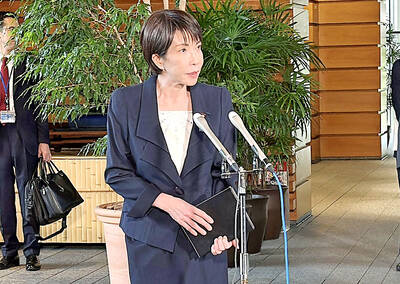Territorial disputes in the South China Sea are likely to drag on for decades, and mounting demand for resources could intensify them, experts said at a conference on the region that was to close yesterday.
The conference addressed one of the most sensitive political topics for Vietnam and other Southeast Asian countries. Territorial disputes between China and several Southeast Asian countries over the Spratly and Paracel Islands and wide areas of the ocean floor have led to diplomatic protests, seizures of fishing vessels and other conflicts.
“I think we just have to accept the fact that probably some conflicts are not meant to be solved within this lifetime,” said Nazery Khalid, a senior fellow at the Maritime Institute of Malaysia.
Khalid recommended that countries in the region concentrate on areas of mutual agreement, rather than points of conflict. But participants at the conference saw few areas of agreement, apart from cooperation in meteorology and search-and-rescue efforts.
China claims virtually all of the South China Sea, and its claims overlap with those of the Philippines, Vietnam, Malaysia, Indonesia, Taiwan and Brunei. Those countries’ claims also overlap in various areas.
The head of Vietnam’s Diplomatic Academy, Duong Van Quang, said at the opening of the conference that tensions had risen in part due to “attempts to assert legal claims over territory, in parallel with unilateral actions to strengthen control over terrain.”
Quang was referring to China’s recent establishment of a commune-level government on Woody Island, the largest of the Spratlys, which Chinese forces seized from the former South Vietnam in 1974 and which Hanoi still claims.
But international law professor Liu Nanlai (劉楠來)of China’s Academy for Social Sciences made no concessions to the Vietnamese view.
“There seems to be a misconception among many observers that China has taken islands from other countries in the Spratlys,” Liu said. “In fact, before the 1950s and [19]60s, no country other than China had made a claim in the Spratlys.”
Vietnam has recently suggested that ASEAN member states negotiate as a bloc to offset Chinese claims.
Mark Valencia of the US’ Nautilus Institute said such cooperation was unlikely, in part because China maneuvers to block it.
“All China needs to do is to peel off one [ASEAN] country and they won’t be able to move ahead as a bloc,” Valencia said. “So this will drag on indefinitely, in my view.”

‘MOTHER’ OF THAILAND: In her glamorous heyday in the 1960s, former Thai queen Sirikit mingled with US presidents and superstars such as Elvis Presley The year-long funeral ceremony of former Thai queen Sirikit started yesterday, with grieving royalists set to salute the procession bringing her body to lie in state at Bangkok’s Grand Palace. Members of the royal family are venerated in Thailand, treated by many as semi-divine figures, and lavished with glowing media coverage and gold-adorned portraits hanging in public spaces and private homes nationwide. Sirikit, the mother of Thai King Vajiralongkorn and widow of the nation’s longest-reigning monarch, died late on Friday at the age of 93. Black-and-white tributes to the royal matriarch are being beamed onto towering digital advertizing billboards, on

Indonesia was to sign an agreement to repatriate two British nationals, including a grandmother languishing on death row for drug-related crimes, an Indonesian government source said yesterday. “The practical arrangement will be signed today. The transfer will be done immediately after the technical side of the transfer is agreed,” the source said, identifying Lindsay Sandiford and 35-year-old Shahab Shahabadi as the people being transferred. Sandiford, a grandmother, was sentenced to death on the island of Bali in 2013 after she was convicted of trafficking drugs. Customs officers found cocaine worth an estimated US$2.14 million hidden in a false bottom in Sandiford’s suitcase when

POWER ABUSE WORRY: Some people warned that the broad language of the treaty could lead to overreach by authorities and enable the repression of government critics Countries signed their first UN treaty targeting cybercrime in Hanoi yesterday, despite opposition from an unlikely band of tech companies and rights groups warning of expanded state surveillance. The new global legal framework aims to bolster international cooperation to fight digital crimes, from child pornography to transnational cyberscams and money laundering. More than 60 countries signed the declaration, which means it would go into force once ratified by those states. UN Secretary-General Antonio Guterres described the signing as an “important milestone,” and that it was “only the beginning.” “Every day, sophisticated scams destroy families, steal migrants and drain billions of dollars from our economy...

PRESSURE: Trump is expected to demand that Tokyo raise its defense spending, but Japan’s new foreign minister said the amount is less important than how it is spent Japan plans to show its determination to further build up its defense to rapidly adapt to changing warfare realities and growing tension in the region when US President Donald Trump visits Tokyo next week, Minister of Foreign Affairs Toshimitsu Motegi said. Japanese Prime Minister Sanae Takaichi’s administration is also finalizing a purchase package, including US pickups, soybeans and gas, to present to Trump, but would not commit to any new defense spending target at the meeting, a source with knowledge of the preparations said. The two leaders are to sit down in Tokyo on Monday and Tuesday next week during Trump’s first